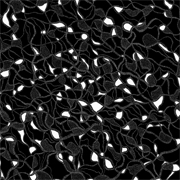Pressing play on any release by Gary War is rather like being blasted headlong into a totally distant but oddly familiar future, where tinny echoes of synth pop, TV commentary and romantic, lyrical dogma drift like imperishable cultural trash in a quietening universe. Much like his sometime collaborator John Maus, New York based avant rocker War is a kind of arch, astral troubadour, making music that’s as elemental and rousing as it is hollow and dystopian. It doesn’t make as much sense live as it does on record, where is can toy with your nerve endings and wrangle with the bits of your brain that are nagged by dark, nostalgic temptations. Maus has pegged War as ‘the future’ – but he’s not talking about the next big thing, rather the very last. This is Pop Music For The End Times. The party before the end of the universe.
The four tracks on this split release, his first since 2012’s blistering Jared’s Lot, carry on that tin can telephone dialogue with the future inevitable. War switches between personas: berserk evangelist, honey voiced crooner, frantic lover and trip-hop automaton. His soundscapes are not wholly different to Maus’ – ‘Alone at the Box’ in particular could easily be a cut from 2011’s We Must Become The Pitiless Censors Of Ourselves, and it’s none the worse for it. Where they diverge is in War’s brighter sound. ‘Wasted Place’ conjures blissful, narcotic wonderment and the giddy ‘I Can’t Breathe’ is backlit by acoustic guitar.
War acts as producer for his co-conspirators on the release, Clementine and Valentine Nixon, aka Purple Pilgrims, New Zealand born sisters who relocated to "the overwhelming, hyper-populated screwtopia of Hong Kong" in 2011. The promo shot for the record casts the trio as stately Oriental royalty, all headdresses and plush satin. The significance of this pantomime posits these tracks as a different sort of future shock – an encounter with a cultural aesthetic that mashes traditional splendour with manic industrialism. Purple Pilgrims are the Yin to War’s Yang, their energy stabilising against the wilder expanses of his sonic kingdom, and it’s refreshing to hear female voices enter into this space of sci-fi machismo. Their three tracks are the highlight of the record.
Purple Pilgrims’ sheer, lapping sound worlds, melded with ghostly vocals, are the sound of traversing unknown distances; the melodies are choral, but feel solitary too. As with Maus and War, there are spectres everywhere, suggestions of singing bodies and recognisable words that never quite make it through to the land of the living. ‘Skin Sight’ could well have been Laura Palmer’s funeral dirge, its picked surf guitar reminiscent of the way that Lynch and Badalamenti were able to conjure something glorious and unsettling all at once. The record closes with ‘Earthly Heaven / Joon’, which rings with chants and yelps before winding down to a delicate bass beat. An altogether more soothing soundtrack for the days to come.


